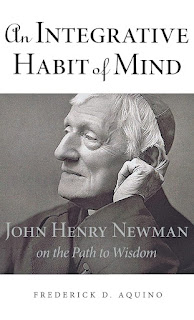As any reader knows, the author of one book can lead you directly to another author's book, either by mentioning it, including it in the bibliography, or directly recommending it.
The conversion of secular culture requires many things – the rebuilding of the family, the recovery of our artistic traditions, the reimagining of the liberal arts, the reestablishment of local priestly vocations, and more. In this book readers discover how Newman’s concept of an integrative habit of mind can help believers reconstitute and re-propose a coherent and emotionally satisfying account of faith and culture for our time.
It's those words in bold that led Topping to lead me to another book: An Integrative Habit of Mind: John Henry Newman on the Path to Wisdom by Frederick D. Aquino: On page 3 in the Preface in a footnote, Topping recommends that readers of his book read Aquino's book because Topping states: "My argument is that if the New Evangelization is to succeed, we need also daringly to manifest Newman's same integrative habit of mind" with the footnote: "See further Frederick D. Aquino's [title as above]".
I already had a copy of the book, purchased from Eighth Day Books. From the publisher, Cornell University Press:
Searching for better ways to inspire people to pursue wisdom, Frederick D. Aquino argues that teachers and researchers should focus less on state-of-the-art techniques and learning outcomes and instead pay more attention to the intellectual formation of their students. We should, Aquino contends, encourage the development of an integrative habit of mind, which entails cultivating the capacity to grasp how various pieces of data and areas of inquiry fit together and to understand how to apply this information to new situations.
To fully explore this notion, An Integrative Habit of Mind brings the work of the great religious figure and educator John Henry Newman into fruitful conversation with recent philosophical developments in epistemology, cognition, and education. Aquino unearths some crucial but neglected themes from Newman's writings and carries them forward into the contemporary context, revealing how his ideas can help us broaden our horizons, render apt judgments, and better understand our world and how we think about it.
So I've started to read it, but I must admit some of the first sentences of Aquino's Introduction made me think we have a hard row to hoe:
As I intend to show, an integrative habit of mind--the capacity to see how things fit together in light of one another and how an understanding of this sort relates to the situation at hand--serves as the underlying concept for my approach to and appropriation of particular issues in these areas. [Aquino also wants to explore] how the cultivation of an integrative habit of mind shapes the pursuit of wisdom. (p. 3)
How does one work to achieve this habit and practice it?
An integrative habit of mind entails a stable disposition and a capacity to grasp how various pieces of data and areas of inquiry fit together in light of one another, thereby acquiring a more comprehensive issue of the issue at hand. . . . the process of cultivating an integrative habit of mind requires appropriate levels of training, reflection, and the courage to engage and learn from a circle of interlocutors. (p. 4)
I read that as I'd just heard about a Federal District Court judge trying to speak at an event sponsored by a student organization at Stanford University (the Stanford Law School, more precisely) being shouted down by students and lectured by Associate Dean for Diversity, Equity and Inclusion. The University's president and the Law School have since apologized to the judge.
The apology is appropriate, but the trouble is that the protesters did not have "the courage to engage and learn from a circle of interlocutors" to start with and could not abide by stated University and Law School policies to protest without disrupting an event, nor did the administrator enforce those policies. Thus there was no opportunity for an exchange of ideas or even for one set of ideas to be expressed.
So how do we even begin to create an environment for the engagement with and learning from "a circle of interlocutors" when the mere presence of the judge was considered dangerous, according to quotations from the university's newspaper? It does give me pause even as I start reading Aquino's book and am still thinking about Topping's guidance in his book. It will indeed take courage, great courage.
Saint John Henry Newman, pray for us!


No comments:
Post a Comment